It’s the year 2011. The big waves lashing against Kovalam beach, Chennai, Tamil Nadu, have fishers casting their nets for a fresh catch. Nearer the coast, rather unexpectedly, a couple of teenagers and seniors alike are bobbing on surfboards, trying to catch the next big wave to ride.
Back then, Showkath Jamal must have smiled at how far he had come from his days of studying to be a lawyer to starting the ‘Bay of Life’ School.
One wonders if he had imagined then that starting a surf school would entail drowning deaths, open defecation and dealing with authorities who only used the word ‘surf’ in the context of the internet.
And yet, in the 10 years since, Showkath has a rather interesting tale to tell.
Making The Largest Reserve A Playground
“Though we have the ocean in our backyard, we have always been afraid of it,” begins Showkath.
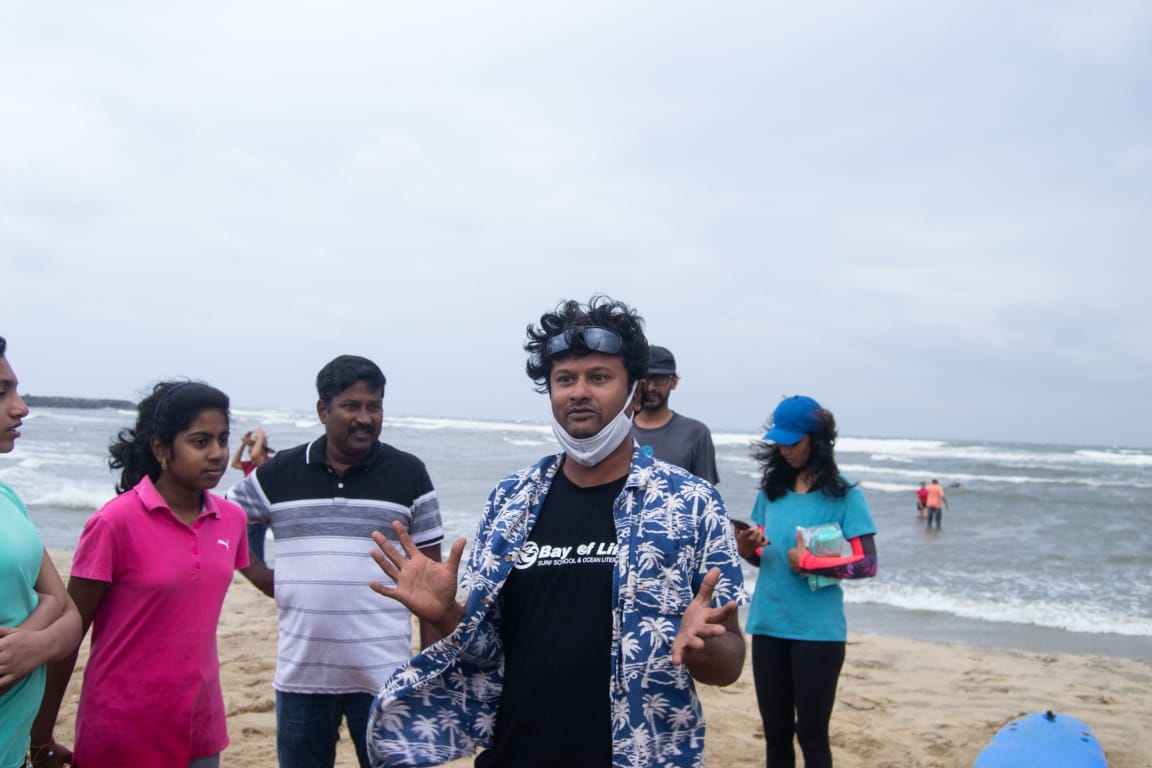
From his school days, Showkath was interested in reptiles. But he was compelled to study law, as his family featured a long line of lawyers. He has no complaints. “I did my five years of law school, then completed my Masters in Business Law in 2004. During that time, I realised I had a great passion for teaching,” he says.
He began teaching law to BA students while also volunteering with the Crocodile Bank and the Snake Park in Chennai.
But after being bitten by the entrepreneurial bug, Showkath decided to start his own BPO in 2005. A few years later, he wed Madhu Ravi and the next year, in 2009, he started Yo Potato, which he describes as ‘Swiggy before Android’. Though both his ventures didn’t take off as he hoped.
Growing weary of jumping career paths, Showkath sought his wife Madhu’s advice, who suggested he combine his passion for wildlife conservation with his career.
“I went to the Kalinga Centre for Rainforest Ecology (KCRE) and studied under my mentor Gowri Shankar. That’s how I got into wildlife conservation full time. But I couldn’t find any reserves that I could work with,” he says.
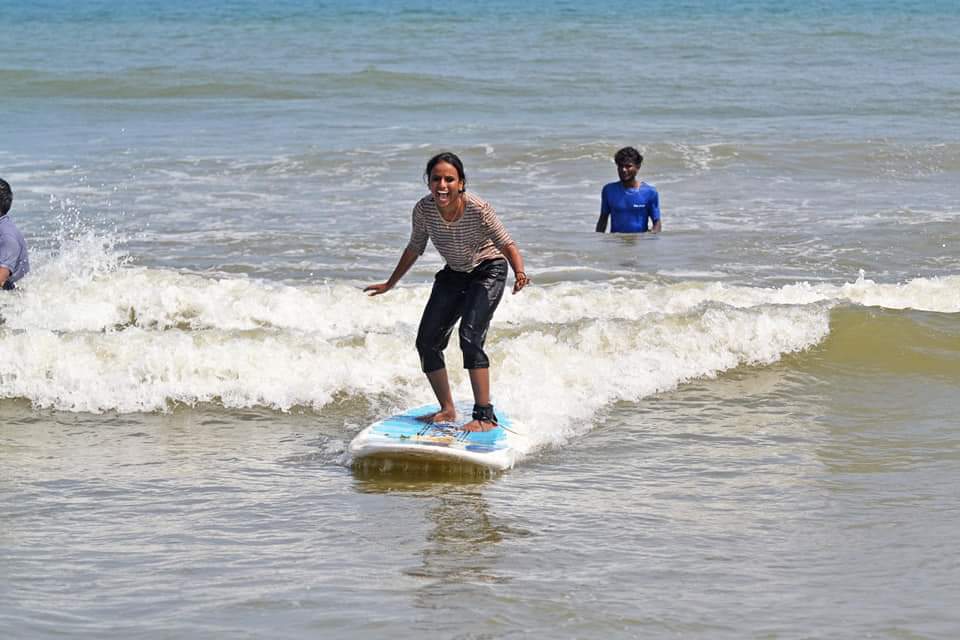
“At the time, there were a lot of drowning deaths making headlines in the papers. These deaths mostly occurred because of ignorance and the lack of structured facilities to learn ocean safety. Also, other than fishing, people didn’t take much interest in the ocean,” says Showkath.
On returning to Chennai and watching foreigners surf on the beach one day, he realised “the ocean is the largest reserve on earth”. “I thought, if we start a surf school where we can teach people about the ocean and how they can enjoy it, then people will come and take care of it,” he says, adding that he first took surf lessons from these foreigners and later invited a senior surfer, Reece McGowen, from California to teach the team to surf for a period of six months.
That’s how the ‘Bay of Life’ School came into being in 2011.
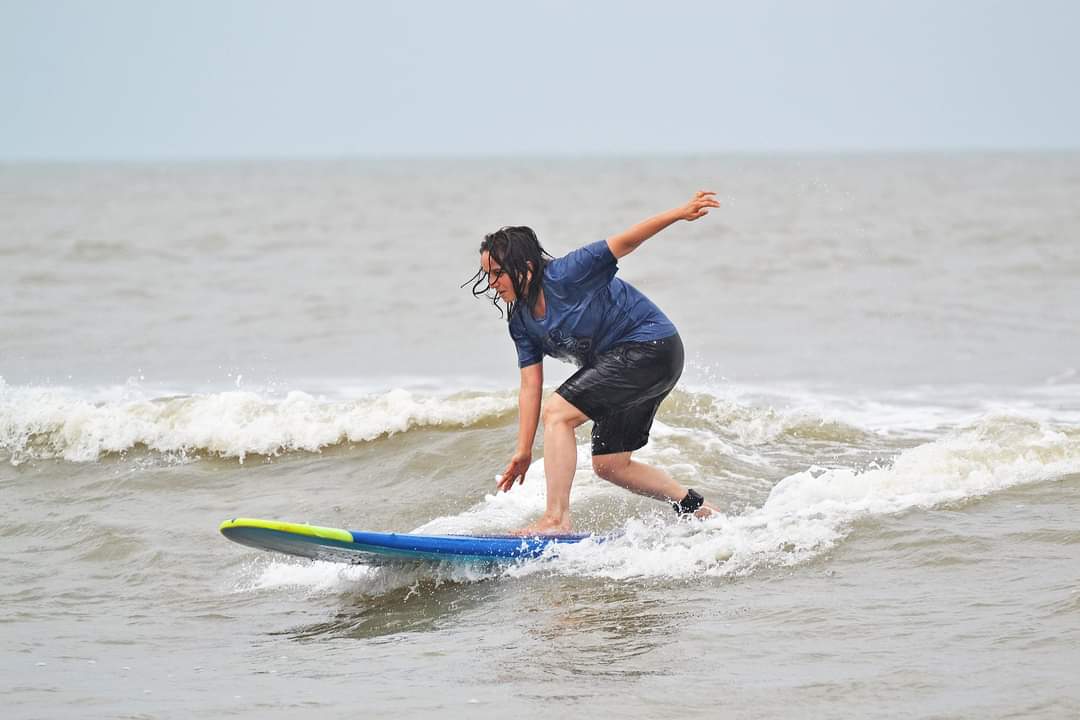
A Pooping Problem
Though, getting NOCs (No Objection Certificates) and requisite permissions from the government was a challenge. “People used to hear the word ‘surfing’ and think, ‘Internet surfing?’ We spoke to the sports department and the local tehsildar (Deputy District Collector), who were clueless about it. My first objective was to get the Sports Ministry involved. Back then, there were two surf schools in the country. The collector at the time, Harish Chhabra, was quite adventurous and supported us a lot. We also approached the marine coastal security group, the Navy and the Indian Coast Guards East Command,” says Showkath.
However, the biggest challenge came from the local villages.
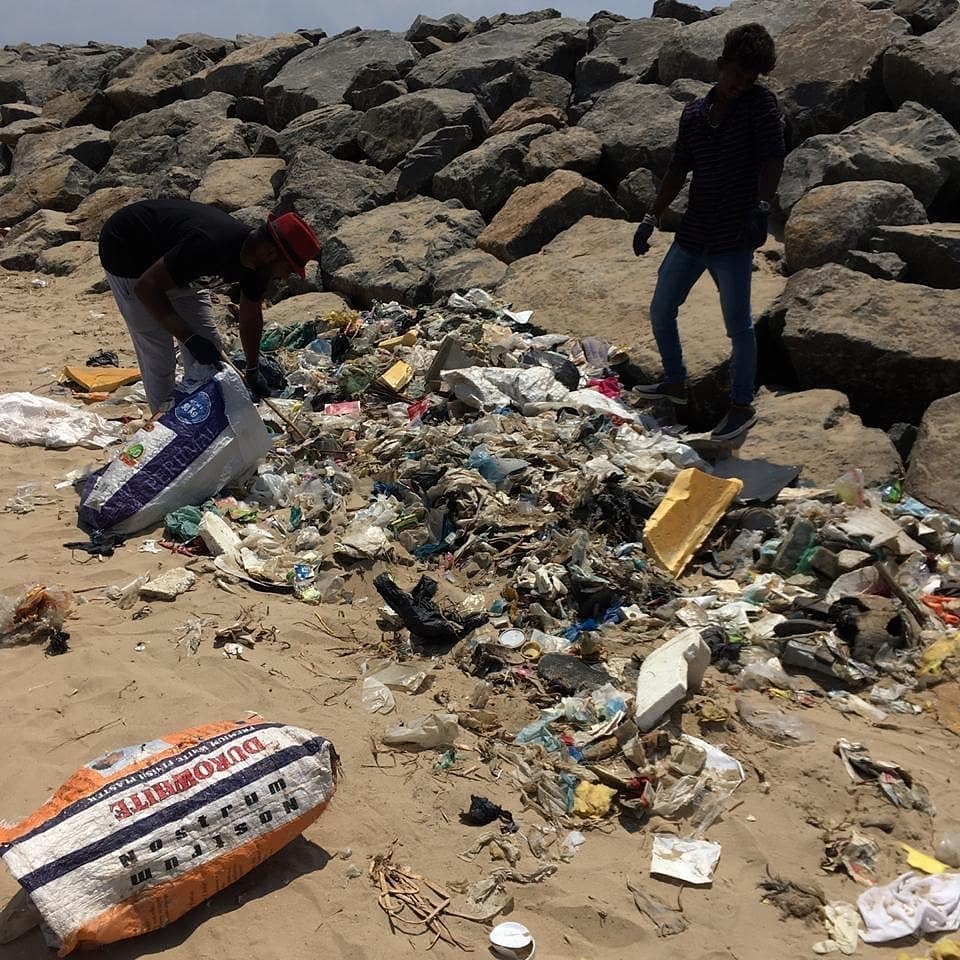
“The beaches were used as a public toilet among fishing villages. When we asked them not to defecate in the open, we used to get threatened,” laughs the surf instructor.
On researching, they found that the villagers had toilets, but instead of a drainage system, they had septic tanks. And cleaning the septic tanks every three months was costly.
“We ruled out building toilets for them and started to research behavioural changes. We started approaching the village children and told them that we would give them free surf lessons if they kept up their grades. A lot of kids came onboard who helped with our classes on weekends. When the children of the village found the elders, mostly Chittappas, defecating in the open, they would confront them, and that’s what brought about a change in their behaviour,” says Showkath, who also did his Masters in Research Methodology.
It took two years to get the village men to stop defecating on the beach.
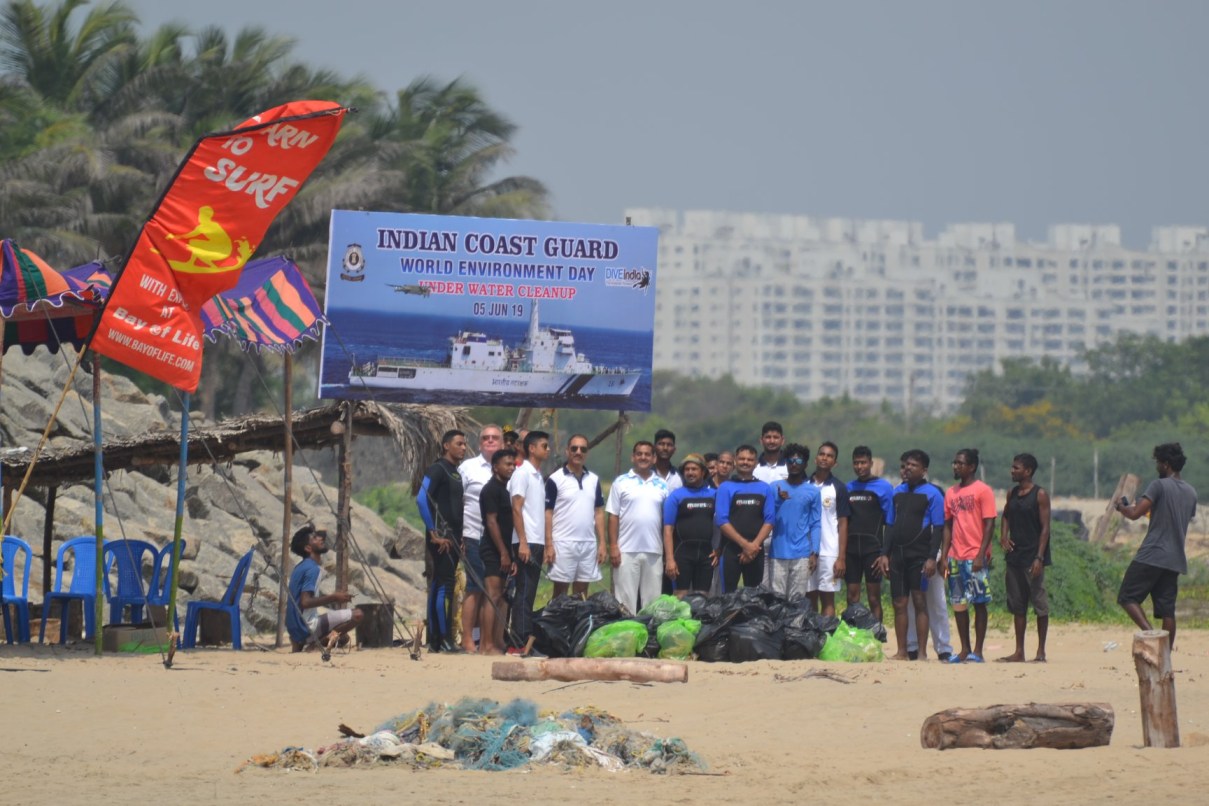
A decade later, the Kovalam beach is completely transformed with people surfing, resting under beach umbrellas, kayaking, and kite surfing.
Trading In Free Surf Lessons
There are three rivers in Chennai — Kosathalaiyar, Cooum and Adyar, whose estuaries are very bad. “But the Muttukadu estuary that is connected to the backwater by the Buckingham canal is relatively clean. Here we have crabs, seabass, resident birds, 15 migrant birds, mangroves which becomes a bio hotspot. We wanted to start preserving its condition so that it doesn’t end up like the other estuaries,” says Showkath.
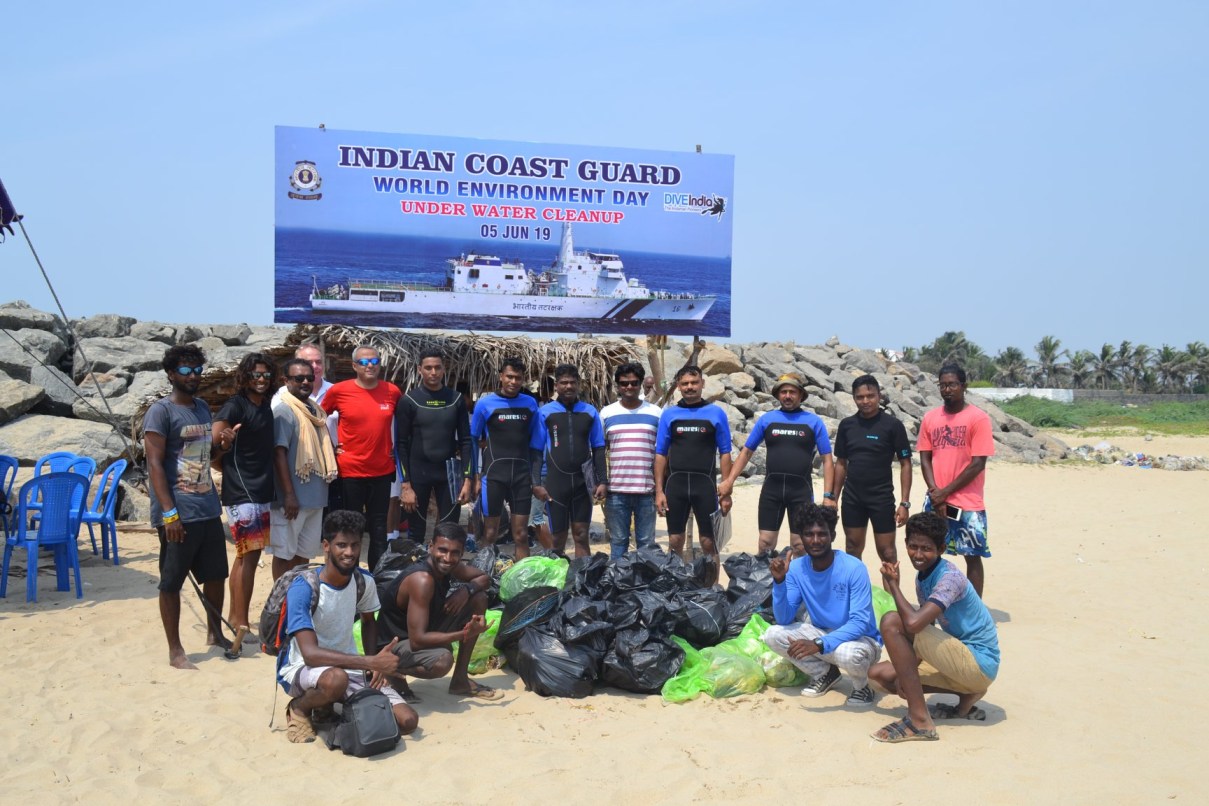
He adds, “We started our first beach clean up drive in 2012 with schools and colleges. Students that needed certain credits would come to clean the beach. But this was not a permanent solution.”
“Eventually, we’d have to deal with disposing of the garbage properly, ensuring that illegal dumping of waste should not happen in the rivers, recycling plastic and other waste. Then we came up with the concept of free surf lessons. This project was officially launched in 2017,” he says.
As the number of people opting for free classes increased, the school had to schedule these to not clash with paid classes. Within two years, there were 500 kgs of waste collected.
Over 600 people have opted for free classes via beach clean-ups to date.
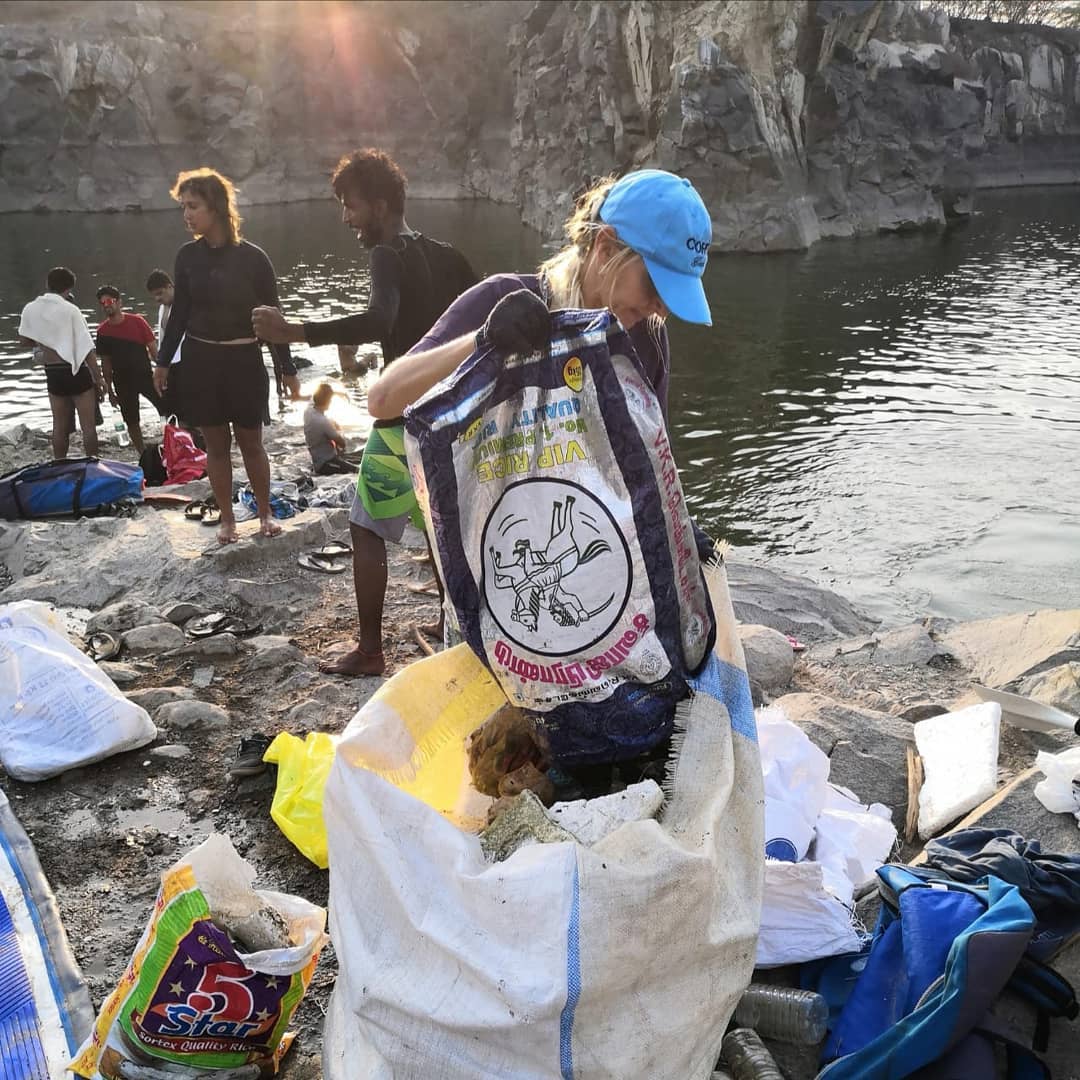
“During the same time, we launched the Bay of Life Foundation — a registered NGO that runs on the profits from our surf school. To date, we have recruited a few marine biologists and 16 volunteers for the foundation, while the school has 14 trained surfers who have trained 9,000 students,” says Showkath.
Over the years, the school has cleared up 24 tonnes of waste.
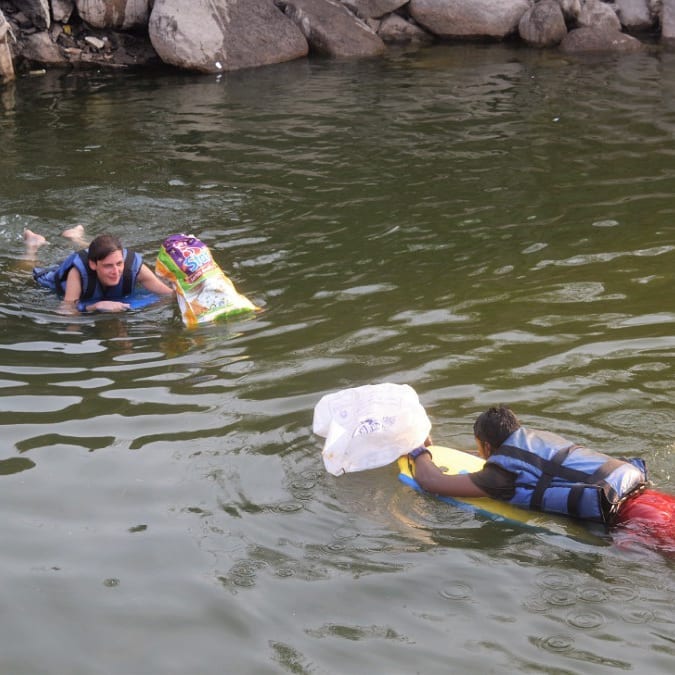
“We collect the most amount of trash from November to February. During this time, when the northeastern winds are blowing, the tide brings in the trash from the north. So, if you clean up the beach, six hours later, you will come back to find it in the same state,” he says, adding that no beach clean-ups are scheduled during this period.
To qualify for a free surf lesson, the beach is allotted into grids. Students will have to clean space of 3×3 metres and submit the trash in the Bay of Life office. People have to collect 5kgs of non-biodegradable waste. After a tiring day of cleaning the beach, they may not be up for a surf lesson, so the school administers coupons that they can redeem at any time.

“During the 2015 Chennai floods, we removed at least 20 truckloads of trash from the beach,” says Showkath, adding that in 2019, in association with the Indian coast guards, the school launched ‘Inside Out’ – where beach cleaners would clean the shore, and scuba divers would clean the ocean bed.
“There were a lot of abandoned fishing nets. The coast guards even provided choppers, and in one day, we collected 600 kgs of waste,” he exclaims.
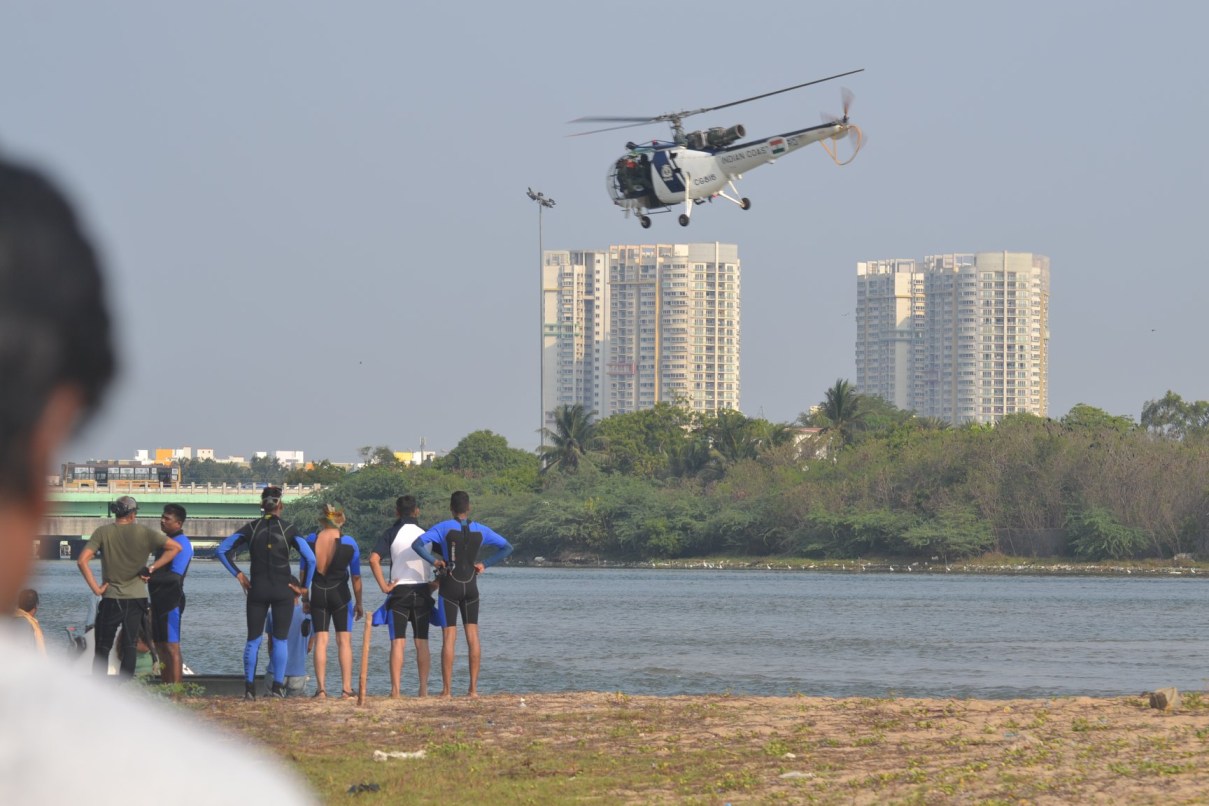
Surf’s Up!
In 2019, Niharika was surfing the internet for adventure training activities for the Indian coast guards. She found several schools offering surf lessons, but the one that caught her eye was Bay of Life. “I was based in Chennai at the time and called them up to ask if they would conduct classes for the armed forces, and they agreed to teach us free of charge,” says the now-retired Coast Guard Officer.
“There were 25 of us who went for surf lessons in December that year. We were taught the basics of surfing, the safety factors and then we were given practical training. It was a very memorable experience. They also showed us the efforts they’re taking for their conservation projects like bird watching, beach cleanups, Inside Out, etc.,” she says.
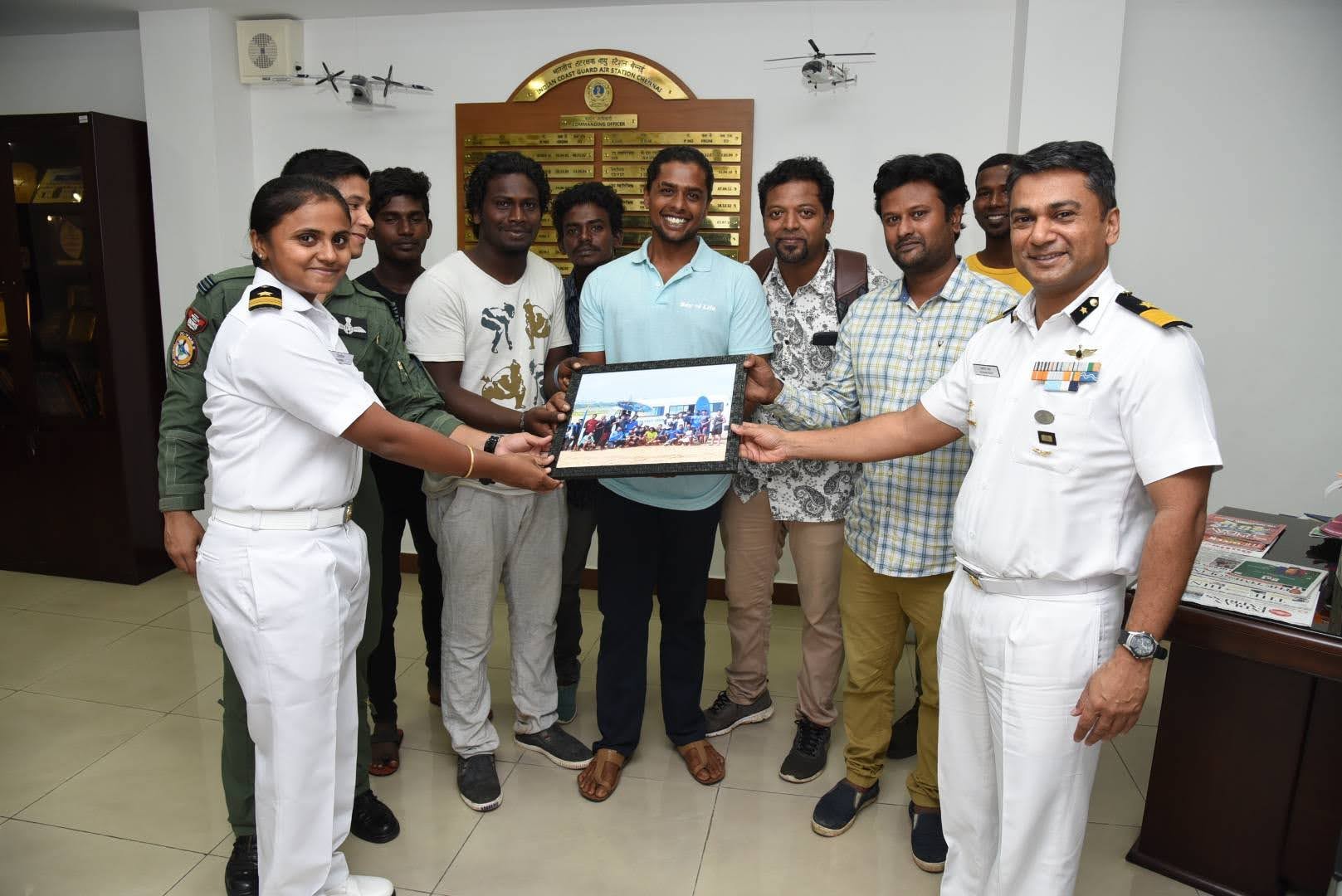
“None of us knew how to surf. We were from the aviation team, so our sea time involved just flying overseas. But instructors like Showkath were extremely helpful even when training us on basics. The sessions are very interactive. The team admires and respects the sea, and that shows in their training too,” says the 30-year-old.
The school has trained everyone from 6 to 60, who attend training thrice a week.
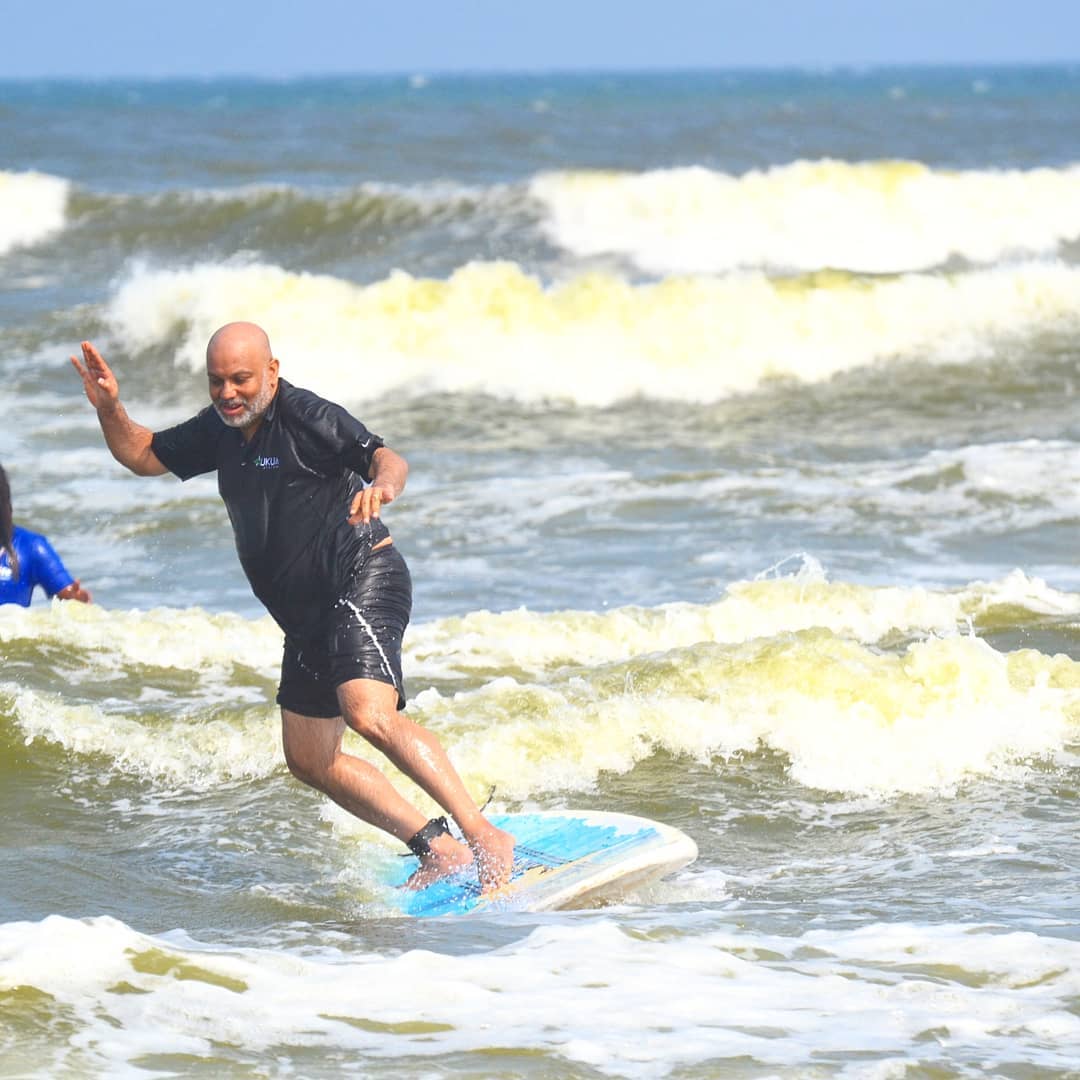
Customers can opt for the Discover Surf lessons starting at Rs 1500, a trial session for those who have never learnt swimming or surfing.
There’s also a Foundation Course starting at Rs 18,000, which has 15 lessons. The Advance Beginners Course lasts 6 months, and the intermediate sessions are Rs 1000 per class.
“We have also started ocean safety lessons to teach people how to survive in the ocean even if they don’t know how to swim,” says Showkath, adding that they would get at least 15 students a day.
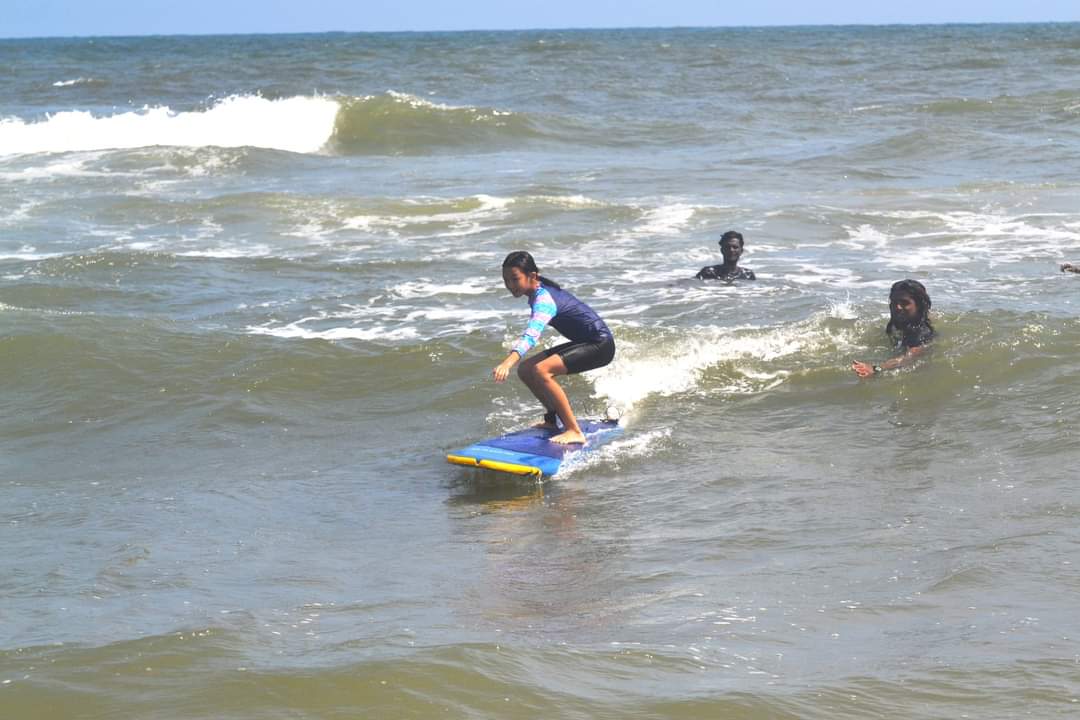
With the pandemic, there has been a dip in the number of school kids and office participation. But after the lockdown rules were eased, there have been more students booking surf lessons.
In keeping with his love for reptiles, Showkath has started ‘Scientific Training On Reptile Management’ (STORM) in association with Gowri Shankar with KPRE in Chennai and Mysore. “We have trained over 800 snake rescuers in the country – 400 are active rescuers, few of whom rescue at least 10 a day,” he says.
The school has also added scuba diving lessons to its kitty in association with Dive India. The team is now working on preventing plastics from entering the ocean with the help of floating barriers.
(Edited by Vinayak Hegde)
No comments:
Post a Comment